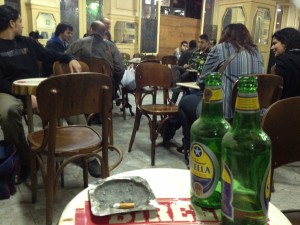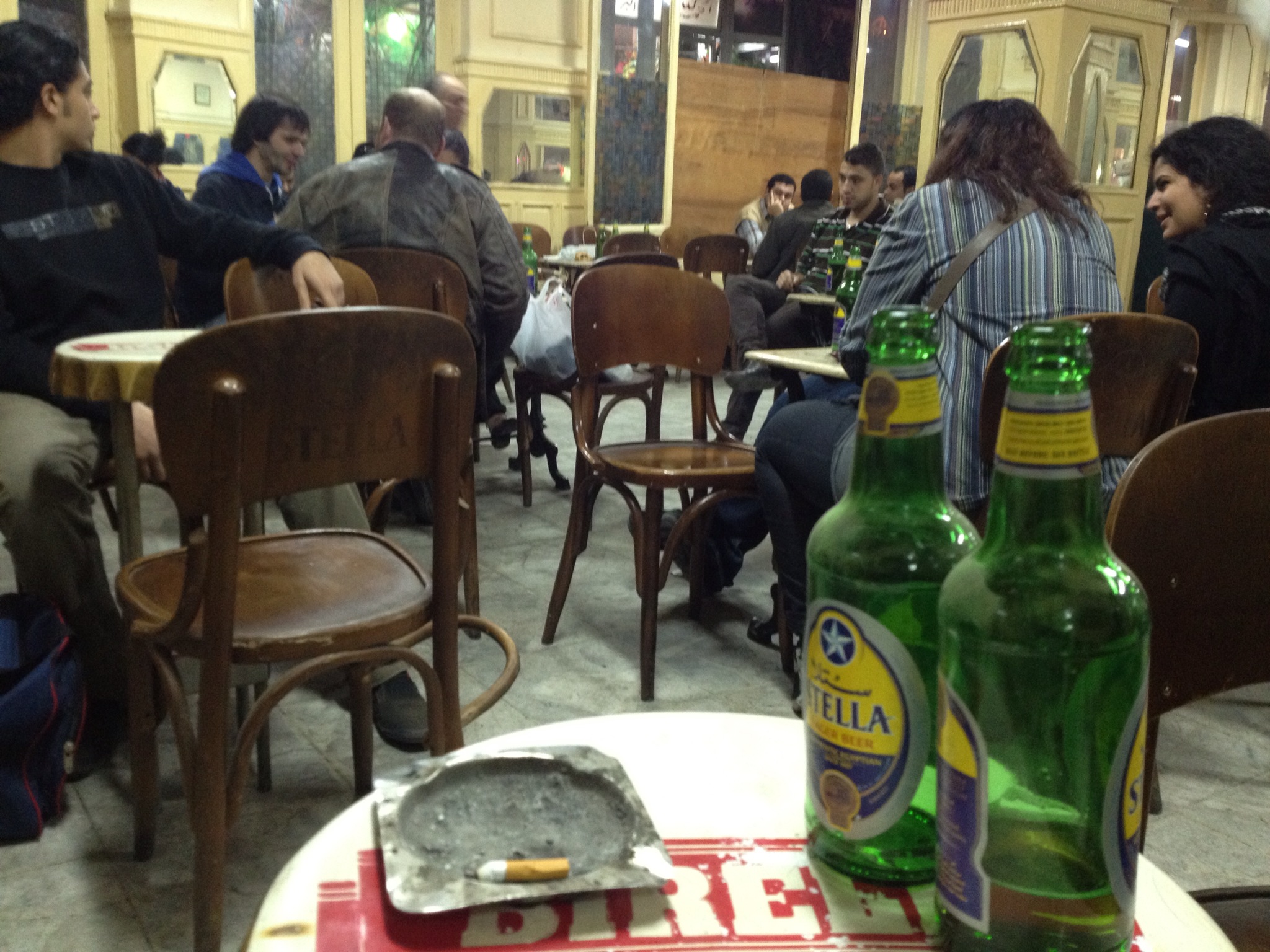
Men fill a smoky, loud, and small room in an alley off Sherif Street in downtown Cairo. Tables weighed down with Stella, Vat-20, a local brandy, and small platters of cucumbers, nuts, and seeds line the walls of the small establishment. The sounds of Om Kalthoum blare from the large mounted television, an item that seems to have accidently found its way into the otherwise old and worn watering hole.
Gemaica Bar seems nondescript to the untrained eye, but not to its local patrons and many other clientele who have passed the waning hours of another crazy day in the capital with friends. Downtown Cairo is filled with places like these, often tucked away in backstreets, feeling like speakeasies, and often announcing their presence with nothing more than an illuminated Stella sign.
Most political and legal discourse concerning alcohol has focused on its role in tourism. Downtown Cairo is home to more than 50 drinking establishments, diverse in clientele and atmosphere. Places such such as the Greek Club on Tala’at Harb Square and Hurreyah a few blocks over on Falaky Square host large numbers of foreigners and Egyptians alike. The same can be said about the iconic Windsor Hotel bar and the Odeon Palace. However most of the khamarat (bars) in Downtown Cairo are surreptitiously located in central areas and cater largely to local patrons.
“There is fierce international competition in the field of tourism,” said Egyptian President Mohamed Morsy in an interview with Reuters, “there is no room for any apprehension of these fears.” His answer was in response to a question about the possibility of forthcoming restrictions on alcohol consumption in Egypt and gender segregation at the score of tourist resorts that line the country’s coasts.
The issue of alcohol regulation has been dealt with delicately and almost exclusively within the context of tourism and consumption by foreigners. Islamist candidates Abdel Moneim Abul Fotouh and Mohamed Morsy repeatedly stressed the importance of the “freedom of tourists,” largely in reference to alcohol.
On the other hand, the influential Salafist Al-Nour Party has taken a stronger stance on the future of alcohol in Egypt. Party spokesman Nader Bakar told workers in the city of Aswan last December that his party would ban the sale of alcohol in hotels to all Egyptians, and would only allow foreigners to bring alcohol from abroad to consume in their hotel rooms.
In the contentious electoral campaigns following the revolution, secular politicians have shied away from the topic of alcohol. Most Egyptians do not drink alcohol in observance of their Islamic faith, and the topic alienates voter bases, especially given its relative unimportance among the myriad challenges and issues currently facing the country. Prominent businessman and a main funder and founder of the Free Egyptians Party Naguib Sawiris was ridiculed in the aftermath of a highly controversial interview with the Canadian International Council, in which he professed his fondness for whiskey when expressing concern over the impediment of personal rights in Egypt.
During the presidential elections, rumours swirled around concerning presidential candidate Amr Moussa’s alcohol consumption. In 2010, Mohamed ElBaradei, who had emerged as a strong advocate for democratic reform, accused the Egyptian government of leaking photos of him and his family at his daughter’s wedding sitting at a table with alcohol in an attempt to damage his reputation.
During Ramadan this year, Tourism Minister under former prime minister Kamal El-Ganzoury, Mounir Fakhry Abdel-Nour, reiterated the law banning the service of alcohol to all Egyptians during the Islamic holy days of Islamic New Year, the night of Isra and Mi’raj, the Prophet’s birthday, and Arafa Day. During these holidays and the holy month of Ramadan, bars and restaurants are subject to strict penalties for serving to Egyptians, Muslim and non-Muslim alike.
However, the link made between alcohol policies and foreigners is no new phenomenon. Law 63, passed in 1976, states “It is prohibited to offer or consume spirits or alcohol in public places or shops excluded from this provision: (A) hotels and tourist facilities specified in accordance with the provisions of Law 1/1973…and (B) clubs characterised by tourism as determined by a decision of the Minister of Tourism in accordance with Law 77/1975.” Both of the previous laws mentioned in the 1976 legislation essentially endowed the Minister of Tourism the authority to deem what establishments catered to foreigners in order to determine venues for alcohol and gambling (another activity also heavily restricted for Egyptians).
This means that the government must evaluate new establishments wishing to obtain licenses to serve alcohol as venues that will cater to foreigners. Most of the khamarat like Gemaica Bar were able to obtain licenses in times when restrictions were much more lax. Aside from the case of hotels, obtaining liquor licenses proves challenging outside of areas such as Maadi and Zamalek, areas with relatively high levels of non-Egyptian residents.
Despite restrictions on alcohol, the industry continues to perform relatively strongly and is a strong source of tax revenue for the government. Consumption increased in 2011, although growth rates slowed down from past years due to recession, dramatic drops in tourism numbers, and government-imposed curfews in the first half of 2011. In an interview with presidential hopeful Abdel Moneim Abul Fotouh, Dina Abdel Rahman estimated that Egypt receives roughly eight billion pounds from alcohol taxation (Abul Fotouh went on to state that domestic production of alcohol should be halted, as it is not compatible with Muslim or Christian values).
However, massive taxes on spirits (3,000 percent) have created a thriving black market that curbs the government’s tax revenue. Al-Ahram Beverages dominates the Egyptian market and employs almost 3,000 people. The beverage company was established in 1897, nationalised in 1963, privatised in 1997 and was acquired by Heineken in 2002. Al-Ahram Beverages currently has breweries in Badr City, Obour City, and Sharkia City, and also possesses a winery, distillery, and a malt plant.
According to Al-Ahram Beverages, Egypt is the 17th largest beer market in Africa and the Middle East, reaching a demand of roughly 110 million litres annually, of which 690,000 are alcoholic beer.
DNE spoke to some regulars at Gemeica bar,“We’ve been coming here for years to spend time with each other,” said Khaled, a tour guide in his 50s .“Here, you’ll find people from all social classes, Muslims and Christians,” he added, pointing out a lawyer and a taxi driver sitting in the corner of the room. As Om Kalthoum’s Amal Hayati faded out, a more upbeat song by Saad Al-Soghayar came on. The men sang and clapped to the beat, while a few got up and started dancing around the cramped tavern.
“We’re naturally nervous, just like everyone else,” said a manager, who requested to remain unnamed, at a popular downtown bar.“We’re attracting 30 percent of the customers that we did before the revolution,” he added while gesturing to clusters of empty chairs on a Friday night. “People are afraid to come downtown because there’s no security.” He was optimistic about future prospects however, believing the government knows the value of venues like his and that people would begin coming back as stability returns to Egypt and the downtown area.
Similar to Gemaica Bar, one can repeatedly walk past the centrally located Cap D’or without noticing the well-known watering hole, which is entered from a side street behind a kiosk. Music from a radio behind the bar plays old Egyptian classics as people help themselves to rounds of beer and brandy. “[The Government] talks about the importance of tourists for places like this,” said Gomaa, a Cap D’or manager, “but if we relied only on foreigners for business, we’d close down.
Ninety percent of our customers are Egyptian.” Gomaa also expressed optimism for future business at his drinking establishment. “The people in charge talk about God’s law, but in reality they’re criminals, and we’ll see worse criminals after them,” he asserted. “People here just want to live their personal lives and those in charge would gain nothing from them by prohibiting alcohol.”
According to Muslim Brotherhood-run website Ikhwanweb, Morsy stressed in May 2011 that a decision to ban alcohol would be up to parliament and not the Muslim Brotherhood. However, now that the former senior Brotherhood leader has been elected, and Freedom and Justice Party candidates are expected to repeat their success in the reelection of parliament, the issue will most likely be decided upon by the political faction that has taken the most nebulous stance on the issue thus far.
Most signs point to an unchanged alcohol policy for non-Egyptians visiting or living in Egypt. However, questions concerning the extent of Egyptian citizens’ access to beer, wine, and spirits continue to linger. And while President Morsy’s new government deals with urgent economic and political dilemmas, thus far, tourism and alcohol laws have gone hand-in-hand. Although local owners and patrons remain optimistic, it’s a trend that is sure to continue, as the Egyptian government carries on its track record of endowing its visitors more rights than its own citizens.




